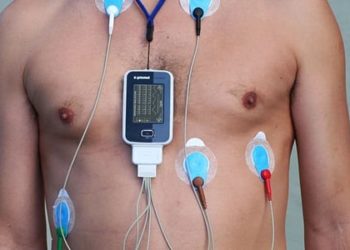Greater school night sleep associated with significant improvements in school-based emotional lability and impulsivity
Image: PD. EEG during deep sleep.
Key study points
- Behavioral and emotional regulation is improved in children aged 7 to 11 years who slept just 27.36 minutes longer (on average) than their weekday norms, as rated by teachers blind to their sleep status.
- Sleeping less than accustomed norms (by an average of 54.04 minutes) resulted in worse behavioral and emotional regulation.
Primer: In recent years, especially with the advent of increasing ‘screen time,’ including the ubiquitous use of cell phones and other handheld devices, children’s bedtimes are getting pushed to later and later. In pre-adolescents, inadequate sleep is an increasingly prevalent problem. This has been purported to have a negative impact on the quality of learning and ability to pay attention in school, as well as decreased sleep-enhanced consolidation of newly acquired material and skills. However, the precise impact that specific quantities of sleep gain or loss can have on academic and behavioral outcomes in this school-age population is less well elucidated. Most previous studies in this area have used correlational methodologies, making it hard to draw quantitative and mechanistic conclusions. In addition, there are consequently no clear recommendations around hours of sleep needed on school nights. The few studies that have used an experimental prospective protocol to analyze these questions have focused on impact on memory, task vigilance, and sleepiness, all of which are only surrogates for actual school performance. This study is the first randomized, prospective study to measure the impact of measurable quantities of either sleep loss or gain on actual behaviors in the school setting.
Background reading:
This [single-blinded, prospective, randomized] study examined the impact of either sleep restriction or extension in a sample of 34 typically developing children aged 7 to 11 years with no problems at baseline. Students were randomized to either sleep one hour longer or one hour less than their usual weekday amount for five consecutive nights.
The outcome of interest was teachers’ evaluations of students’ behavioral problems and emotional regulation abilities using the Conners’ Global Index Scale. These included items about whether a student was noted to cry, lose his or her temper, or become easily frustrated, for instance. Teachers were blinded to the sleep duration assigned to each student. A secondary outcome was parents’ rating of their child’s daytime sleepiness.
An extension of sleep (by an average of 27.36 minutes) was associated with detectable improvements in teacher-reported estimates of students’ emotional lability and restless-impulsive behavior and a significant reduction in reported daytime sleepiness. A restriction of sleep (by an average of 54.04 minutes) was associated with detectable decreases in teachers’ behavioral ratings and increases in parental observations of daytime sleepiness. Interestingly, though sleep quality was found to be better (less interrupted) in the sleep restriction group, they still performed worse on these outcomes.
In sum: This study clearly showed that day-to-day behavioral and emotional regulation abilities is impacted by duration of nightly sleep in school-age pre-adolescents. Teachers blinded to the sleep status of a child were able to detect differences that were clinically significant, even though the differences in sleep obtained were fairly modest. The prospective nature and use of actigraphy to monitor quantity of sleep were also particular strengths of the methodology. This was, however, a fairly small sample and one that was convenience-based, and larger studies are needed to confirm these findings.
Click to read the study in [Pediatrics]
By [DB]
© 2012 2minutemedicine.com. All rights reserved. No works may be reproduced without written consent from 2minutemedicine.com. DISCLAIMER: Posts are not medical advice and are not intended as such. Please see a healthcare professional if you seek medical advice.




